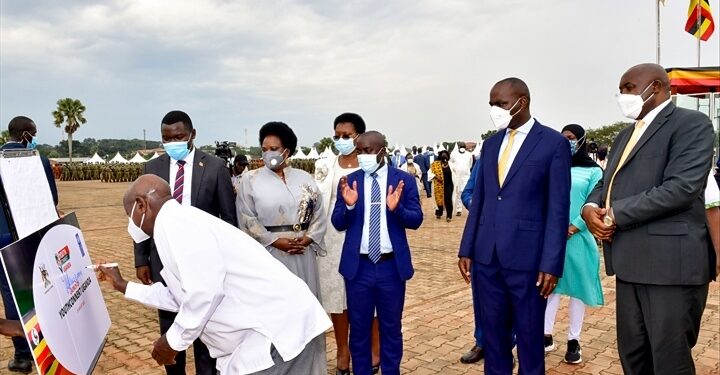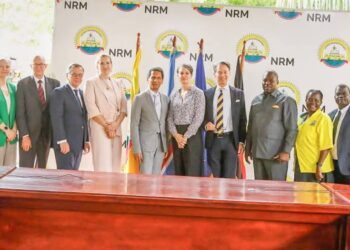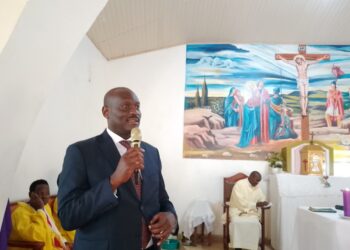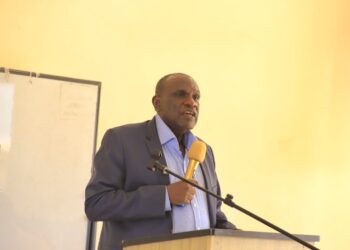President Yoweri Museveni has rallied the youth to wholeheartedly embrace the Parish Development Model (PDM) if Uganda is to achieve the much desired socio- economic transformation.
According to the President, the youth should be agents of fundamental change aimed at transforming the 39% of Ugandans in subsistence agriculture.
Gen. Museveni made the plea during the commemoration of International Youth Day and commissioning of the Regional ICT Infrastructure and E-Government Services at Kaunda Grounds, Gulu City on Friday 26th, August, 2022.
“Under PDM, our target is to upgrade these people and see them pushed into the money economy. It should be abominable for any young person to become a subsistence farmer. That must become a chapter in our political economy books that once upon a time, there lived a people who used to produce only for Ekidha (hand to mouth),” President Museveni said.
He added, “All the progressive youth leaders of Uganda must resolve that their grand parents and their parents are the last cohort of Ugandans to work only for Ekidha!! Society metamorphoses when people are producing enough to eat and have surplus for the market. Every Ugandan must have capacity to earn some money to purchase basic necessities and make some investments in credible enterprises.”
He further disclosed that government’s goal under PDM is therefore to increase household incomes and improve quality of life of Ugandans with specific focus on total transformation of the subsistence households (39% – 3.5million households, 17.5m people)- both on farm and off farm in rural and urban settings into the money economy, as well as eradication of poverty and vulnerability in Uganda.
“While deepening decentralization and devolution to support development and planning at the Parish level, our strategy as Government is to promote increased incomes through modernization of agriculture, industrialization and information communication and technology. It is a good coincidence that on this same day, I am commissioning the regional ICT Infrastructure and E-government services,” he noted.
“It is important for all people of Uganda to get to know and appreciate that Science, Technology and Innovation (STI) together with ICT enables the acceleration of the entire economy and this supports the digital transformation and the move towards digital (smart) health, digital (Smart) agriculture, digital (smart) manufacturing, digital (Smart) cities among other. Our goal has been and remains that of increasing the application of appropriate technology in the production and service delivery processes through the development of a well-constructed STI eco-system.”
Mr. Museveni also encouraged all youth leaders to play a significant role under the PDM, mobilize the masses, enhance financial literacy for households, innovate, participate in trainings to build capacities, promote Civic education, leverage the power of ICT, encourage formation of SACCOs and participate in infrastructural development.
“The PDM needs thinkers, creators and innovators – let us kick poverty from our midst together, – let subsistence production and poverty be our enemy number one. Every Ugandan must do everything possible under PDM to tame the fangs of poverty and rescue the about 3.5million families from subsistence agriculture. As we consolidate our gains as government, we shall continue to build bridges between our generations to ensure intergenerational harmony, peace and tranquility.”
On the other hand, the President revealed that government has prioritized Agro-Industrialization that offers a great opportunity for Uganda to embark on its long-term aspirations of increasing household incomes and improving the quality of life of many of our youth.
“Ugandan youth must know that Agro-Industrialization has a number of advantages and these include among others; It is an avenue for promoting inclusive and equitable growth; Uganda has a positive trade balance in agro-industrial products; It is an opportunity to add value to agricultural raw materials in order to promote export expansion of high value products; It provides an opportunity for import substitution and It provides an opportunity to address the high post- harvest losses, minimizes losses to disasters, stabilize prices and increase house hold incomes.”
“The EAC Vision 2050 seeks to promote value addition through Agro-processing. The African Continental Free Trade Area (AFCFTA) aims to increase a single market for goods and services facilitated by movement of person in order to deepen the economic integration of the African Continent. This is an opportunity for Uganda to exploit its Agro-Industrialization Agencies in order to feed the global value chain. Our strength as African people is domiciled in the deepening, broadening and widening the integration of the Africa-Continent. We must integrate in order to freely solve our African problems in an African manner.”
President Museveni also reminded Ugandans that in order to meaningfully transform the economy, there is need to take advantage of the digital transformation.
“ICT is a fulcrum of development; it is an accelerator, amplifier and augmenter of change. ICT has a huge potential to improve national productivity by making government and business enterprises more efficient, effective and globally competitive. It is, therefore, a critical driver of social and economic development. Information and communication Technology (ICT) is one of the major drivers of socio economic transformation as enshrined in the National Resistance Movement (NRM) manifesto 2021- 2026, National Development Plan (NDP) III and Vision 2040 among others.
“The effect of the COVID 19 pandemic has clearly shown us the key role ICT plays in ensuring that the Government remains productive and continues to serve the wanainchi. In anticipation of these current and future challenges, the Government, as far as 2006, spearheaded the digitalization agenda and today we boasts of the National Backbone Infrastructure (NBI) which has enabled various Government Departments serve the citizens through online systems such as e-Agriculture, E-Tax, E-education, e-health e-visa, e-passport, e-Government procurement, security CCTV Cameras, e-courts. Further, the integration platform has enhanced the sharing of information across Government and with citizens.”
Do you have a story in your community or an opinion to share with us: Email us at editorial@watchdoguganda.com













